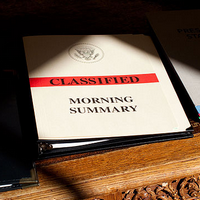In a part of the world where ever-present conspiracy theories waft through the air, blending easily with the aroma from water pipes and the sounds of the Muslim call to prayer, the massive document release from Wikileaks was received with familiarity. It's not easy to shock the people of the Middle East, certainly not with revelations about the conversations and machinations of the rich and the powerful. After all, the region has stood at the crossroads of political intrigue for thousands of years, and people have become almost immune to shock. Still, the absence of real surprises does not equal an absence of impact.
As much as leaders everywhere seem inclined to downplay its impact, the document release has the potential to gradually reshape the Middle East.
The masses may not be exactly startled by what we have learned until now through the Wikileaks revelations: not by trivial accounts, such as Libyan leader Muammar Qaddafi's penchant for traveling with his blonde Ukrainian nurse; nor by the more ominous, headline-grabbing accounts detailing Arab calls for the U.S. to take military action against Iran.

